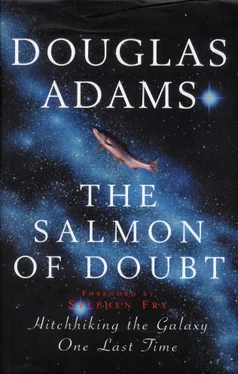The important thing this piece of serendipitous pre-adaptation has given us is a possible DC power standard. An arbitrary one, to be sure, but perhaps we should probably just be grateful that it was designed by a car mechanic in an afternoon and not a computer industry standards committee in a lifetime. Keep the voltage level and design a new, small, plug, and you have a new standard. The immediate advantage of adopting it would be that you would need only one DC power adapter! Think of that! Well, not exactly one, you might need a dozen of them, but they would all be exactly the same! Just get a box of ’em! They’ll just be a commodity item like, um, well, I was going to say lightbulbs, but lightbulbs come in all sorts of different wattages and fittings. The great thing about having a DC power standard is that it would be much better than lightbulbs.
Apart from doing away with endless confusion and inconvenience, the arrival of a new standard would encourage all sorts of other new features to emerge. Power points in convenient places in cars. DC
power points in homes and offices and, most important, DC power points in the armrests of airplane seats ... I have to own up and say that, much as I love my PowerBook, which now does about 97.8 percent of what I used to use the lumbering old desktop dinosaurs for, I’ve given up trying to use it on planes. Yes, yes, I know that there are sorts of power-user strategies you can use to extend your battery life—dimming modes, RAM disks, processor-resting, and so on—but the point is that I really can’t be bothered. I’m perfectly capable of just reading the in-flight magazine if I want to be irritated. However, if there was a DC power supply in my armrest, I would actually be able to do some work, or at least fiddle with stuff. I know that the airline companies will probably say, “Yes, but if we do that, our aeroplanes will fall out of the sky,” but they always say that. I know that sometimes their planes do fall out of the sky, but, and here’s the point, not nearly as often as the airline companies say they will. I for one would be willing to risk it. In the great war against little dongly things, no sacrifice, I think, is too great.
***
We are stuck with technology when what we really want is just stuff that works. How do you recognize something that is still technology? A good clue is if it comes with a manual.
What Have We Got to Lose?
Some of the most revolutionary new ideas come from spotting something old to leave out rather than thinking of something new to put in. The Sony Walkman, for instance, added nothing significantly new to the cassette player, it just left out the amplifier and speakers, thus creating a whole new way of listening to music and a whole new industry. Sony’s new Handycam rather brilliantly leaves out the zoom function on the grounds that all a zoom does is cost money, add a lot of bulk, and render every amateur video ever made unwatchable. (They might, while they’re following this line of thought, consider marketing a record-only video player, and video companies might consider releasing movies that are actually recorded in fast-forward mode.) The RISC chip works by the brilliant, life-enhancing principle of getting on with the easy stuff and leaving all the difficult bits for someone else to deal with. (I know it’s a little more complicated than that, but you have to admit it’s a damned attractive idea). A well-made dry martini works by the brilliant, life-enhancing principle of leaving out the martini.
You also get dramatic advances when you spot that you can leave out part of the problem. Algebra, for instance (and hence the whole of computer programming), derives from the realisation that you can leave out all the messy, intractable numbers. Then there’s the new, improved U.K. directory enquiries service.
A couple of years or so ago, something radical changed: whe you dialed 192, you actually got a civil, helpful answer, usually—and here was the clue—delivered in a Scots accent. The whole operation had been rounded up and moved to Aberdeen where they had a plentiful supply of civil, helpful people who didn’t have to be compensated for living in London. Somebody bright at British Telecom had spotted that the location was immaterial—the problem of distance could simply be left out of the model
(something they have yet to come to terms with in their pricing structures). With a little extra cable-laying, it seems to me that they could have moved U.K. directory enquiries to St. Helena or the Falklands, thus bringing whole new possibilities of employment to areas that were previously limited to the things you could do with sheep. The Falklands could, while they were about it, put in a bid to run Argentina’s directory enquiry service as well, which would give the foreign offices of both countries something to think about.
Almost everything to do with the Net involves spotting the things we can now leave out of the problem, and location—distance—is one of them. Wandering around the Web is like living in a world in which every doorway is actually one of those science-fiction devices that deposit you in a completely different part of the world when you walk through them. In fact it isn’t like it, it is it. Trying to work out all the implications of this is as difficult as it was for early filmmakers to work out all the implications of being able to move the camera. What else is going to fall out of the model?
Over the last few years I’ve regularly been cornered by nervous publishers or broadcasters or journalists or filmmakers and asked about how I think computers will affect their various industries. For a long time, most of them were desperately hoping for an answer that translated roughly into “not very much.”
(“People like the smell of books, they like popcorn, they like to see programmes at exactly the same moment as their neighbours, they like at least to have lots of articles that they’ve no interest in reading,”
etc.) But it’s a hard question to answer because it’s based on a faulty model. It’s like trying to explain to the Amazon River, the Mississippi, the Congo, and the Nile how the coming of the Atlantic Ocean will affect them. The first thing to understand is that river rules will no longer apply.
From the point of view of readers, it’s useful in much the same way that a paper magazine is: it’s a concentration of the cash around the Internet, and that will involve readers being billed tiny amounts of money for the opportunity to read popular Web pages. Much less than you would, for instance, regularly spend on your normal newspapers and magazines because you wouldn’t have to be paying for all the trees that have to be pulped, the vans that have to be fueled, and the marketing people whose job it is to tell you how brilliant they are. The reader’s money goes straight to the writer, with a proportion to the publisher of the Web site, and all the wood can stay in the forests, the oil can stay in the ground, and all the marketing people can stay out of the Groucho Club and let decent folk get to the bar.
Why doesn’t all the money go to the writer, I hear you (and indeed myself) asking. Well, maybe it will if he’s happy just to drop his words into the digital ocean in the hope that someone out there will find them.
But like any ocean, the digital one has streams and eddies and currents, and publishers will quickly have a role finding good material to draw into those currents where readers will naturally be streaming through looking for stuff, which is more or less what they do at the moment The difference will lie in the responsiveness of the market, the speed with which those streams will shift and surge, and the way in which power and control will shift to those who are actually contributing something useful rather than just having lunch.
Читать дальше










